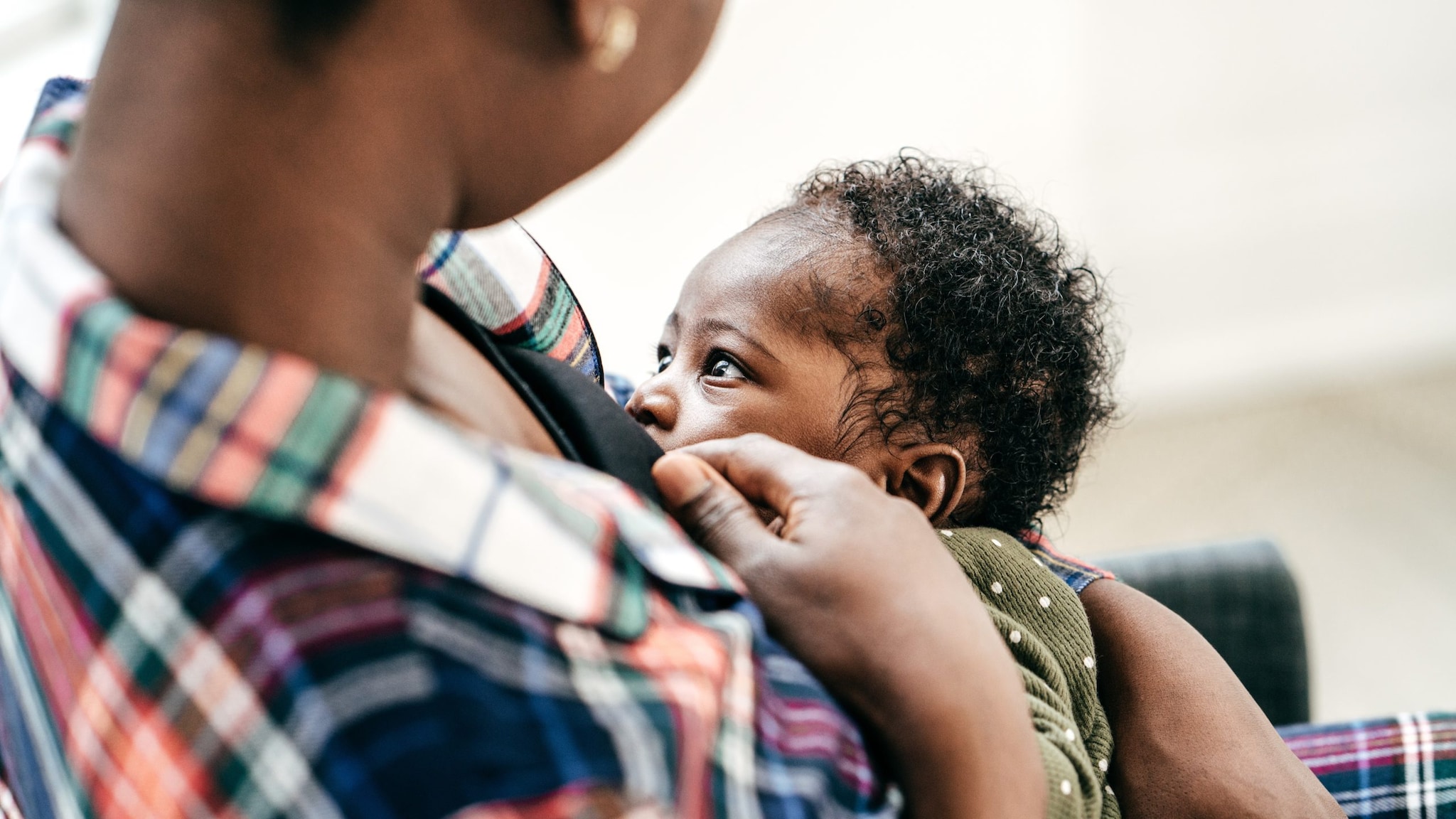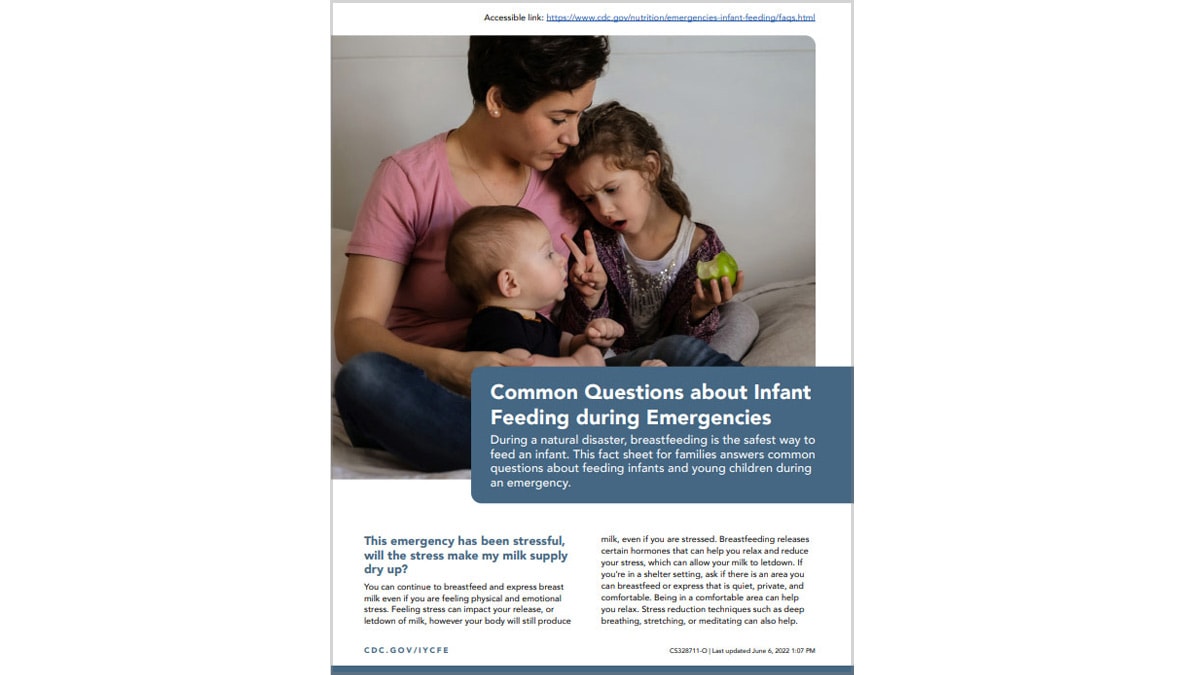At a glance
During a natural disaster, breastfeeding is the safest way to feed an infant. This page offers families answers to common questions about feeding infants and young children during an emergency.

Infant feeding during emergencies
Why is powdered formula not recommended in an emergency?
Using powdered infant formula requires safe water for mixing. It also requires careful cleaning of bottles and nipples after every use. Safe water may be unavailable or limited during an emergency. In that case, you may not be able to safely mix the powdered formula or clean your feeding items.
If you're feeding your child formula, ready-to-feed (RTF) infant formula is the safest option during an emergency. It does not need to be mixed with water and comes in individual single-use containers.
When powdered infant formula is the only option, extra care must be taken to avoid contamination. Extra care includes:
- Mixing infant formula with safe water.
- Using a clean measuring scoop.
- Storing the formula can in a cool, dry place with the lid tightly closed.
- Carefully cleaning all infant feeding items such as bottles, caps, and nipples.
Why is using disposable cups recommended?
Disposable cups are recommended for feeding expressed breast milk or infant formula because the cups do not have to be cleaned. Cleaning reusable infant and toddler feeding items during a natural disaster requires safe water and soap after each use. Safe water may be unavailable or limited during an emergency.
Bottles, nipples, sippy cups, and pacifiers can easily grow germs when not cleaned well, which can make your baby sick. A heat source may not be available to safely sanitize the bottles, which can increase the possibility of your baby becoming sick. If bottle nipples, pacifiers, or other hard-to-clean items come in contact with floodwater, they should be thrown out.
Disposable cups and other feeding items that can be thrown away after one use don't need to be cleaned. Ask for help from a lactation support provider if you need to learn how to feed your baby with a cup.
Where can I find help for pumping breast milk?
If you have access to a phone, call the National Women's Health and Breastfeeding Helpline at 1-800-994-9662 to reach a specialist in English or Spanish. Helpline hours are Monday through Friday, 9 am–6 pm ET. Your doctor or your child's doctor may also be able to help or to connect you to a lactation support provider.
If you are in a shelter setting, tell the shelter staff or emergency relief workers that you are breastfeeding and/or expressing breast milk. Ask for a quiet, private, and comfortable place where you can breastfeed or express. If you need supplies to feed your child and/or a refrigerator to store your breast milk, ask shelter staff for help.
The staff may know someone trained in lactation whom you can speak with or a local lactation support provider you can call. Peer-to-peer support can also be helpful. If a trained lactation support provider is unavailable, ask staff to help you identify another breastfeeding mother for peer support.
Support during stress or illness
Will stress dry up my milk supply?
You can continue to breastfeed and express breast milk even if you are feeling physical and emotional stress. Feeling stress can impact your release or letdown of milk. However, your body lwill still produce milk. Breastfeeding releases certain hormones that can help you relax and reduce your stress, allowing your milk to letdown.
If you're in a shelter setting, ask if there is an area you can breastfeed or express that is quiet, private, and comfortable. Being in a comfortable area can help you relax. Stress reduction techniques such as deep breathing, stretching, or meditation can also help.
I feel sick. Can I still breastfeed?
You can and should continue breastfeeding while sick with certain illnesses such as the flu, COVID-19, or diarrhea, or if you have a breast infection such as mastitis. Be sure to wash your hands with soap and safe water or use a hand sanitizer with at least 60% alcohol to help prevent spreading germs.
However, you must get medical attention to diagnose your illness. If you have access to a phone, call your doctor if you are feeling sick or have a fever. If you are in a shelter, notify shelter staff or an emergency relief provider.
Be sure to tell the medical provider you are breastfeeding. Although most medicines are okay to take when breastfeeding, certain medications may not be recommended. Learn more about the safety of common medications while breastfeeding.
Your body will still produce breast milk even if you are sick. It's important to rest and keep up your milk supply. If available, talk to a lactation support provider about keeping up your milk supply if you have to stop breastfeeding for a while. Breastfeeding can provide comfort and help keep your baby hydrated if your baby is sick.
Practical tips for safety and storage
I brought a cooler. How can I store my milk?
If you packed breast milk in a cooler when you left your home, after arriving at your destination, do one of the following:
- Use the breast milk right away.
- Store it in a refrigerator.
- Freeze it.
If you are in a shelter setting, tell shelter staff or a relief worker that you have a cooler of breast milk with you. Ask where you can store it. Ask for supplies to label your milk if you haven't already.
Refer to CDC's milk storage guidelines to determine how long to store your milk. Frozen breast milk that has started to thaw but still contains ice crystals can be refrozen. If your breast milk has completely thawed but still feels cold, put it in the refrigerator and use it within the next day or throw it away.
Resuming breastfeeding after interruption
I stopped breastfeeding for a while. Can I start again?
Relactation is possible. Relactation is when you start breastfeeding again after having stopped for some time (weeks or months). Breastfeeding is a supply-and-demand process that requires stimulating the nipple and removing milk from the breast. You may be able to relactate or re-establish your milk production by pumping, hand expressing, and/or nursing directly at the breast often. Relactation depends on many different factors, and regular help by a lactation support provider is important. Ask shelter staff or an emergency responder if a trained lactation support provider can help you.
Infants and young children who are receiving human milk from a parent who is relactating must be carefully monitored to make sure the child is getting enough to have normal weight gain. Breast milk substitutes (formula and donor milk) should be continued as needed to make sure that infants continue to receive enough nutrition if milk supply is not (yet) adequate.

